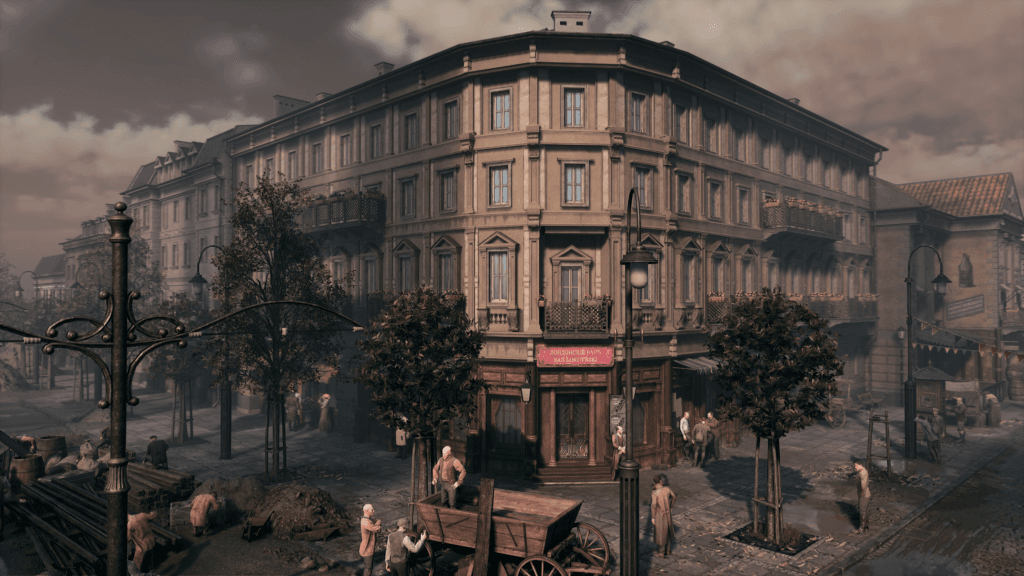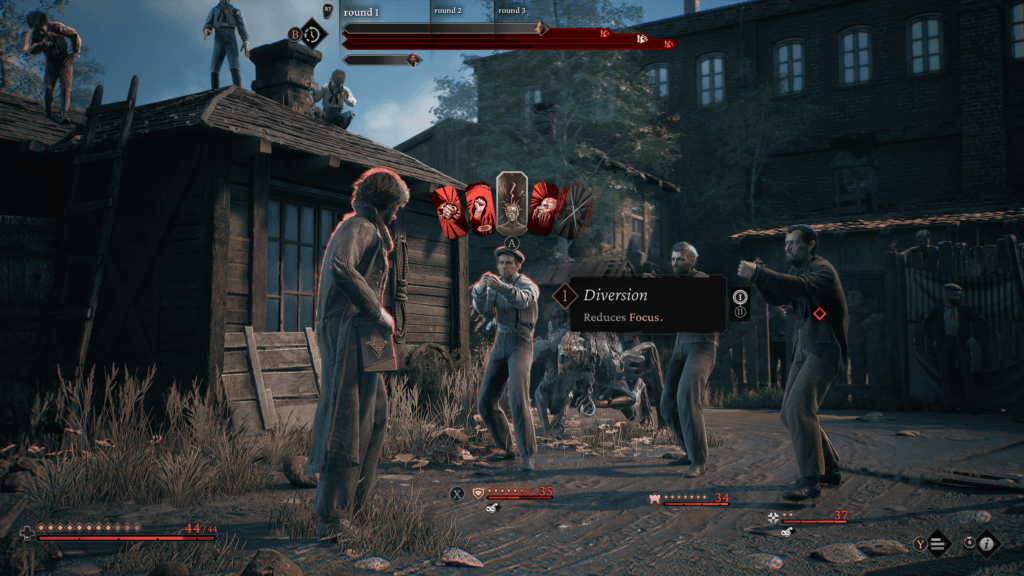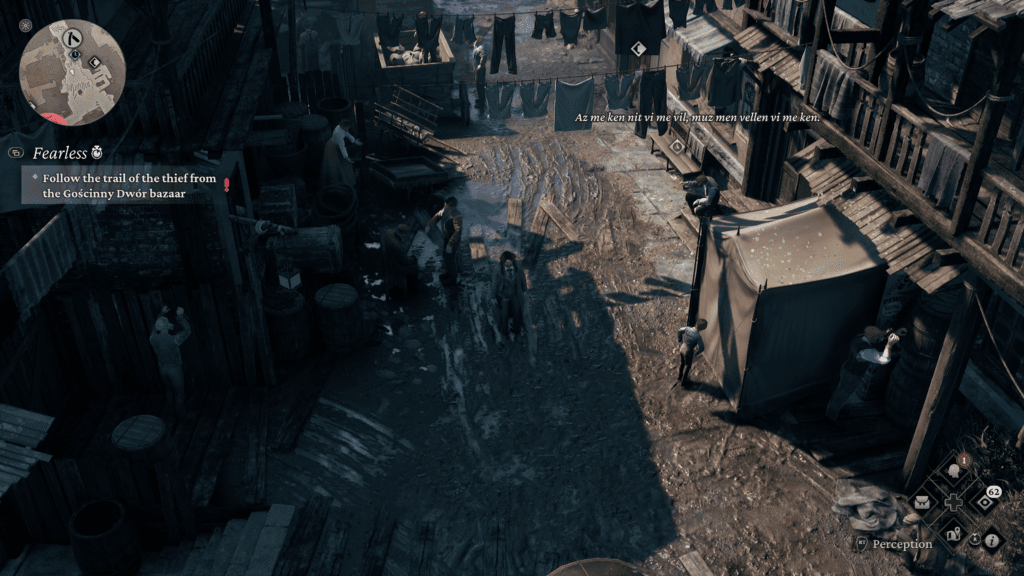Set a little while after the turn of the 19th Century in Russian-occupied Warsaw, The Thaumaturge (‘a worker of wonders’ and ‘performer of miracles’) is equal parts historical fiction and the supernatural. You play Wiktor Szulski, a detective and (you guessed it) thaumaturge, who returns to the city to investigate the mysterious death of his estranged father. This entails roaming around (isometric) environments, searching for and connecting clues, talking to NPCs, fighting with some of them (a turn-based affair) and moving the story along through a handful of key choices.
Over the course of a playthrough that took a little under 20 hours, I was pleasantly surprised by the game, despite an opening that made me quite wary. For starters, the optimisation wasn’t great, the voice acting was distinctly average, and the accents were frankly quite incoherent geographically. These could have potentially killed off a lesser game, but not The Thaumaturge. It had enough personality, quirkiness, serviceable gameplay loops and narrative depth to carry it over the finish line.
As touched upon briefly, our protagonist Wiktor is a thaumaturge — gifted with some magic and the ability to communicating with ghostly apparitions known as salutors. Each of these creatures represents a particular flaw (pride, envy, recklessness and such-like) and the game lets you enhance linked abilities once you capture a salutor. It’s not quite Pokémon, but you do have to go through a protracted turn-based battle to claim them. And once they are yours, you can use their abilities in combat or under normal circumstances (to manipulate someone, for instance)… again, like Pokémon, but not quite. The more of these you collect, the more options you’ll have at your disposal when it’s time to dispatch foes, but it comes with a tradeoff. In order to collect all (or close to all) the salutors, you’ll have to step on a number of toes and make some unfavourable decisions.
And therein lies the biggest draw of The Thaumaturge. Several games throw numerous characters and side quests at you, and in so doing, lull you into a false sense of comfort that your choices and decisions matter. Very often, they don’t. Not a jot. That’s not the case here, where every interaction or decision feels weighty and consequential. As does when you decide to embark on a certain side mission, because it’s possible to be locked out of certain quests or lose favour if you fail to complete a certain task before another. One example of the latter concept is a meeting you are asked to attend. Remember to buy a box of doughnuts before you arrive, and it makes things a lot smoother for you. Fail to do so, and you’ll have to deal with a bit of pushback and reticence. However, the purchase of said doughnuts is never indicated as a critical task to you, and so you are left to your own devices to decide how important a task it is.

Holding your journey together is a riveting story brought to life by some very solid writing. Sure, it can be a tad anachronistic (with weirdly out-of-place phrases popping up every now and then), but one tends to overlook such piffling matters when the overall narrative is so gripping. Social and political upheaval in pre-First World War Warsaw provides the backdrop for an inherently personal tale. It doesn’t help matters that the way of life (and indeed, lives) of thaumaturges across the city is under threat. In the midst of all this is a mysterious resistance group that seeks to topple the oppressive ruling regime. And at the heart of it all is a magician trying to find himself within this crazy world
This is by no stretch an open-world game. There are around half-a-dozen or so explorable areas, but none of them are particularly large. That said, the ability (and need) to change the time of the day to access particular quests does add a bit of variety to these zones. Additionally, lore is scattered all over in the form of books, notes, letters, newspapers and scraps of paper. While exploration is entirely optional, the game does nudge you in the direction of unearthing these pieces of information by rewarding Experience for every discovery. This, in turn, lets you level up your skills and flaws.

Rich and engaging it certainly was, but additionally, the forking nature of the narrative was such that I constantly found myself making mental notes about what I’d do differently in my next playthrough. At the game’s conclusion, I was glad to note that those particular decisions did shape my journey quite a bit, and so, the replayability factor is definitely high with The Thaumaturge. Between generous slabs of storytelling and world-building comes combat, and I must admit that I found the turn-based fare a bit basic at the start. But once you factor in all the salutors, their powers, the (admittedly small) variety of enemies and how they work in combination with one another (and a host of buffs and debuffs) that things get a lot more interesting. I was pleased to see a gameplay element that started off so ho-hum turn so very compelling by the end.
But — and there’s always a but (always) — there were some blemishes. I won’t belabour the point, but the voice acting was truly dire. And the accents, not only did a lot of them feel out of place, but they leaned rather generously into stereotype rather than making any attempt at linguistics. We’ll move on. Behind the cogent writing and surprisingly complex turn-based combat lurks some frankly shallow detective work: Hitting this game’s equivalent of a scanner looks great visually, but it reduces the whole detection part of the game to running around trying to ping various points of interests until you’ve located enough of them for the game to put evidence together and draw a conclusion. Rinse and repeat.

This is a shame since Wiktor is meant to be a detective, which means he needs to be connecting those clues himself. Several games have made use of evidence boards (with varying levels of detail), and a similar gameplay mechanic here would not have gone amiss. Elsewhere, such technical issues as slow load times, pop-in textures, strange facial animations and a spot of stuttering mar what could have been be a seamless experience. These aren’t game-breaking issues, to be sure. But they do derail what could otherwise have very easily been one of the most accomplished games of the year.
In closing, The Thaumaturge is worth your time because it balances the depth of a well fleshed-out world with the snappy writing of a short-paced adventure. It uses its relatively small environments well to construct a believable and memorable setting in which you can lose yourself for a few hours, and to which you’d like to return long after the end credits have rolled. And if you can look past some of the hiccups, you’re in for an absorbing adventure.
Game reviewed on Xbox Series X. Review code provided by publisher
A version of this article originally appeared on The Qun


